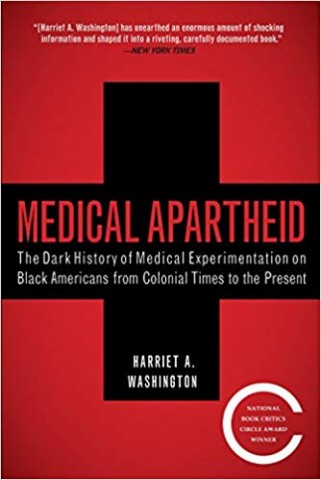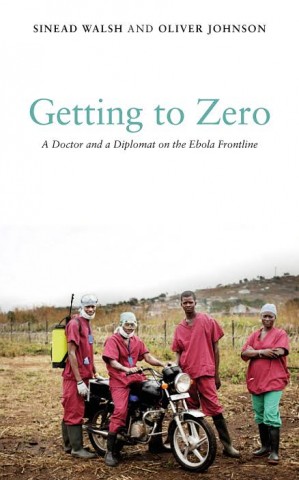Winner of several awards, Harriet A. Washington's "Medical Apartheid: The Dark History of Medical Experimentation on Black Americans from Colonial Times to the Present" (2006) documents a history we tend only to know bits and pieces of. Those familiar with ethics will be aware of the Tuskegee Study, but likely not the bigger story. This is a troubling read, but one that should be read. The book is not published by a university or academic press, and certain quotes and references are not cited, which leaves some potential interesting trails to follow as dead ends. Nonetheless, it is recommended. A few quotes of note:
- "Use of the term race to denote biologically different types of mankind evolved only in the eighteenth century, when the study of animal breeding gave rise to heightened awareness of animal subspecies and the possibility of breeding animals to encourage desired traits. Not coincidentally, this period coincided with the growth of the slave trade, when the biological distinctiveness of men became economically important. Those who studied the different groups of men were called ethnologists and were the forerunners of anthropologists. Ethnologists applied the classification and the categorization methods of the natural sciences, called taxonomy, to the study of man. Even after the meaning of race came to include subgroupings of man, it had several meanings. By races, some meant biological subspecies of man, analogous to the different breeds of dogs. For example, Swedish natural Carl von Linne - Carolus Linnaeus, the most famous of the taxonomists – categorized Africans (and, by extension, U.S. blacks) as Homo afer, theorizing that black men had different evolutionary forebears and had evolved along a separate evolutionary track from white men." (p. 33)
- "Sim's silver sutures did help to end a real medical tragedy for many women, and some excuse the abuse of enslaved women on this basis. This essentially utilitarian argument presents an ethical balance sheet, with the savage medical abuse of captive women on one hand and countless women saved from painful invalidism on the other. However, such an argument ignores the ethical concept of social justice, and these experiments violated this essential value because the suffering and the benefits have been distributed in an unfair way, leading to distributive injustice. In this case, the most powerless group, which is also a racially distinct group and a captive group, is the group upon which doctors inflicted harm "for the greater good." Another, privileged group enjoys the benefits but shares neither the pain nor the risks. Thus the more unexpected acceptability is clear." (p. 69)
- "the decision not to treat these sick men of the Tuskegee Study is a different crime, a crime of omission, and it illustrates several of the important patterns explored in this book. These include the selection of blacks for the riskiest studies; their disproportionate selection for nontherapeutic experimentation; the myth of medical distinctiveness (which held that syphilis was manifested differently in blacks); and the myth of hypersexed blacks as "incorrigible" vectors of sexual disease and dysfunction. The use of men as reservoirs of syphilis reinforce the familiar use of black bodies to generate the profitable wonders of new disease approaches (to which the subjects are rare the privy), and the clinical display of disease in the clinic and in medical journals." (p. 182)
- "The United States also chose to seek Nazi expertise. In 1945, the U.S. State Department, army intelligence, and the OSS, the immediate forerunner of the CIA, recruited former Third Reich scientist, granting them immunity, jobs, and new identities in a resettlement program for Nazi scientists. It was named Operation Paperclip, for the mode of identifying potential recruits - a simple paper clip placed on each of their dossiers. In exchange, the State Department asked that the scientist resume their old habits - working on secret nonconsensual research projects, many of which exploded patients - but this time throughout the United States." (p. 229)
- "research into sickle cell disorder, the first identified molecular disease, remains underfunded and the disease still awaits an effective treatment, but effective genetic therapies were mounted within just a few years after the gene for cystic fibrosis was discovered in 1989. Whites are at much higher risk than blacks for cystic fibrosis." (p. 315-316)
- "This book uses the term race because it is accepted argot, it can be a convenient, commonly used way of designating ethnic groups that are perceived as distinct. We all know what we mean (or think we do) when we denote someone's race as "black" or "white." In our nation, race is inarguably important in discussions of health and disease. However, the Human Genome Project has erased any lingering doubts: Biological race does not exist, because all humans share the same genes. Although the proportions of genes differ, meaning that genetic differences exist, these variations map very poorly on to what we think of as races. This seems to introduce a logical contradiction: If race is not real, how can we speak of race-based therapeutics? The answer is that race is real, but it is not biological: It is social. What correlates very closely to most "racial" differences ns life expectancy, mortality, disease susceptibility, and survival is the race to which one is perceived as belonging." (p. 317)



